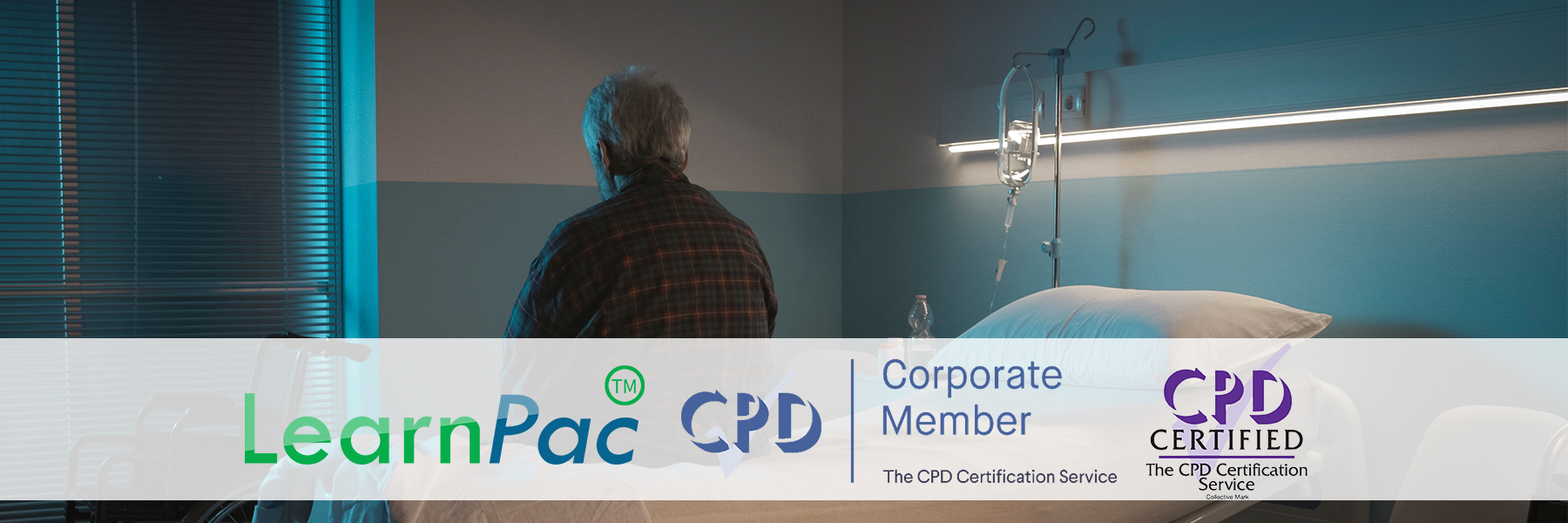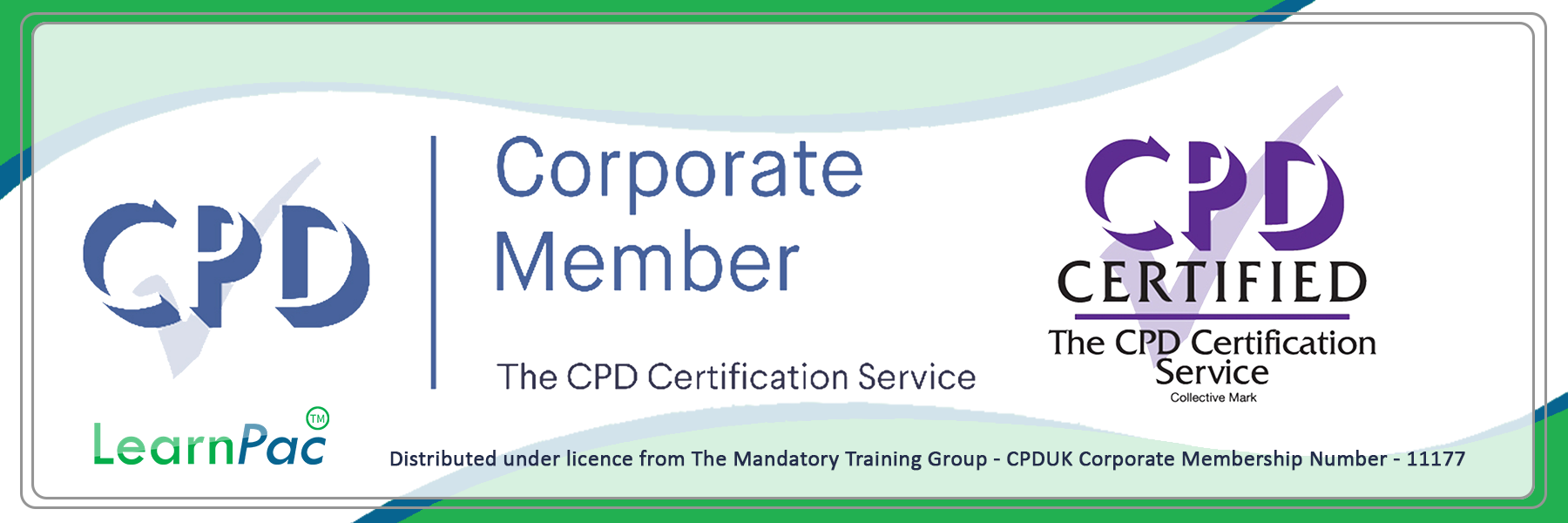Dementia Awareness Training - E-Learning Courses - CPDUK Accredited

Dementia Awareness Training – E-Learning Courses with Certificates – CPDUK Accredited Online Courses.
LearnPac Systems is the leading UK provider of accredited statutory and mandatory training courses for all sectors, including health and social care, education, local government, private and charity sectors.
Dementia develops when the brain is damaged by diseases, such as Alzheimer’s disease or a series of strokes. Alzheimer’s disease is the most common cause of dementia, but not the only one. The specific symptoms that someone with dementia experiences will depend on the parts of the brain that are damaged and the disease that is causing dementia.
These comprehensive dementia awareness training intend to explain dementia, including its causes and symptoms, and the measures to diagnose and treat the condition. Further, it looks at some of its different types and how to support people with dementia.
Browse our Dementia Awareness Training - E-Learning Courses
Dementia Awareness Training: Frequently Asked Questions and Answers
Dementia Awareness Training Courses – Online Training Courses with Certificates – CPDUK Accredited – LearnPac Systems UK.
Here at LearnPac, we received many questions about dementia. We have provided answers to the most frequently asked questions about dementia.
Click on the text below to see the answers to the Frequently Asked Questions about Dementia.
Dementia is an overall term for diseases and conditions characterised by a decline in memory, language, problem-solving and other thinking skills that affect a person’s ability to perform everyday activities.
LearnPac System offers a wide range of health and safety training courses for healthcare and social care providers, including sector-specific e-learning bundles, train the trainer courses and professionally developed trainer materials and resources.
Click here for Dementia Awareness Training – Online Training Course – CPD Accredited
Dementia describes a group of symptoms affecting memory, thinking and social abilities severely enough to interfere with your daily life. Though dementia generally involves memory loss, memory loss has different causes. Having memory loss alone does not mean you have dementia.
LearnPac System offers a wide range of health and safety training courses for healthcare and social care providers, including sector-specific e-learning bundles, train the trainer courses and professionally developed trainer materials and resources.
Click here for Dementia Awareness Training – Online Training Course – CPD Accredited
Alzheimer’s disease is the most common cause of dementia. Not all causes of Alzheimer’s disease are known. However, experts do know that a small percentage can relate to mutations of these genes, passing down from a parent to a child.
The typical progression of dementia disease may be broken down into five stages:
- Stage One: No Impairment.
- Stage Two: Very Mild Cognitive Decline.
- Stage Three: Mild Cognitive Decline.
- Stage Four: Moderate Cognitive Decline.
- Stage Five: Mid-Stage Dementia.
Mandatory Compliance offers a wide range of health and safety training courses for healthcare and social care providers, including sector-specific e-learning bundles, train the trainer courses and professionally developed trainer materials and resources.
Click here for Dementia Awareness Training – Online Training Course – CPD Accredited.
There is no one test to determine if someone has dementia. Doctors diagnose Alzheimer’s and other types of dementia based on a careful medical history, a physical examination, laboratory tests, and the characteristic changes in thinking, day-to-day function and behaviour associated with each type.
There is no certain way to prevent all types of dementia. Researchers are still investigating how the disease develops. However, there is good evidence that a healthy lifestyle can help reduce your risk of developing dementia when you are older.
Dementia is more common in people over the age of 65, but it can also affect younger people. Early-onset of the disease can begin when people are in their 30s, 40s, or 50s. With treatment and early diagnosis, you can slow the progression of the disease and maintain mental function.
The exact symptoms experienced by a person with dementia depend on the areas of the brain that are damaged by disease-causing dementia. With many types of dementia, some of the nerve cells in the brain stop working, losing connections with other cells and die. Dementia is usually progressive.
Every person is different, and dementia manifests itself uniquely. The speed at which dementia progresses varies widely. On average, a person with Alzheimer’s disease lives 4 to 8 years after diagnosis, while some can live for 20 years.
Mental ability tests help the diagnosis of dementia. These tests are known as cognitive assessments and may be done initially by a GP. There are several different tests, but the most common method used by GPs is the General Practitioner Assessment of Cognition (GPCOG).
The answer to the hereditary question is not specified. Certain genes can directly cause or increase the risk of dementia, but in some circumstances, these are usually rare.
End-stage or late-stage dementia may last from several weeks to several years. As the disease advances, your loved one’s abilities become severely limited, and their needs increase.
Dementia occurs due to physical changes in the brain and is a progressive disease, meaning it gets worse over time. For some people, dementia progresses rapidly, while it takes years to reach an advanced stage for others. The progression of dementia depends significantly on the underlying cause of dementia.
The two most common causes of death were bronchopneumonia (38.4%), and ischaemic heart disease (23.1%), while neoplastic diseases were uncommon (3.8%).
A brain scan using either computed tomography (CT) or magnetic resonance imaging (MRI) is generally included in the standard evaluation for Alzheimer’s disease and other forms of dementia. These scans can show the loss of brain mass associated with Alzheimer’s disease and other dementias.
There are treatments to help ease the symptoms of dementia. The two most commonly prescribed medicines for dementia are cholinesterase inhibitors and memantine (Namenda). Doctors use them to treat the symptoms of Alzheimer’s disease, which is the most common kind of dementia.
Primary doctors, a neurologist or a geriatrician, will review the medical history and symptoms, which includes conducting several tests to examine the patient.
Dementia is more common in people over the age of 65, but it can also affect younger people. Early-onset of the disease can begin when people are in their 30s, 40s, or 50s. With treatment and early diagnosis, you can slow the progression of the disease and maintain mental function.
Common signs and symptoms include acting out one’s dreams in sleep, seeing things that are not there (visual hallucinations), and problems with focus and attention. Other signs include uncoordinated or slow movement, tremors, and rigidity or parkinsonism.
Cognitive Stimulation Therapy (CST) is one form of non-pharmacological intervention used to support people with mild to moderate dementia. During CST, the person with dementia is invited to participate in therapeutic sessions with a trained practitioner, skilled in interpersonal communication and dementia care.
A diagnosis of dementia does not automatically mean that a person is incapable of living alone. Some people can live on their own for some time after the diagnosis. However, others may be at too much risk to continue living alone.
It is possible that many people have been diagnosed with dementia, but are not aware of their diagnosis. However, early intervention and diagnosis will help the person to comprehend what is going on. As the disease progresses, this may change.
Getting a diagnosis of dementia while still of working age can be challenging. You may still want or need to continue working, whether it is for financial reasons or because you enjoy it. In most cases, it will not be necessary to give up your job immediately.
A mental health condition is considered a disability if it has a long-term effect on your normal day-to-day activity. There are many different types of mental health conditions which can lead to a disability, including dementia and depression.
Dementia occurs due to physical changes in the brain and is a progressive disease, meaning it gets worse over time. For some people, dementia progresses rapidly, while it takes years to reach an advanced stage for others.
The Self-Administered Gerocognitive Examination (SAGE) is an online test that helps to detect the early stages of Alzheimer’s disease or dementia. Developed by researchers at Ohio State University, the test is designed to be done at home and then taken to a physician for a more formal evaluation.
LearnPac System offers a wide range of health and safety training courses for healthcare and social care providers, including sector-specific e-learning bundles, train the trainer courses and professionally developed trainer materials and resources.
Click here for Dementia Awareness Training – Online Training Course – CPD Accredited
As well as progressive brain cell death, like that seen in Alzheimer’s disease, dementia can be caused by a head injury, a stroke, or a brain tumour.
People with symptoms of dementia are given tests to check their mental abilities, such as memory or thinking. These tests are known as cognitive assessments and may be done initially by a GP.
On successful completion of the Dementai Awareness Courses will be able to download, save and/or print a quality assured continuing professional development (CPD) certificate. Our CPD certificates are recognised internationally and can be used to provide evidence for compliance and audit.
The CPD Certification Service (CPDUK) accredits all of our statutory and mandatory training courses as conforming to universally accepted Continuous Professional Development (CPD) guidelines.
LearnPac Systems is distributed under the licence from The Mandatory Training Group – CPDUK Corporate Memebrship Number – 1117




